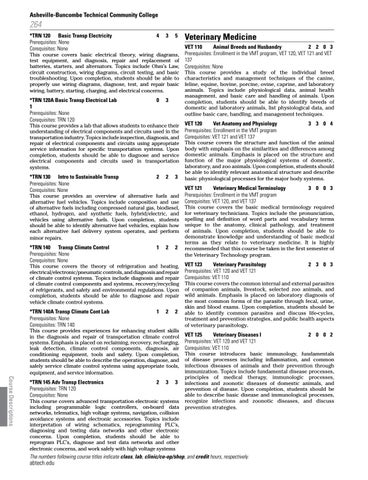Asheville-Buncombe Technical Community College
264 *TRN 120 Basic Transp Electricity Prerequisites: None Corequisites: None
4
3
5
This course covers basic electrical theory, wiring diagrams, test equipment, and diagnosis, repair and replacement of batteries, starters, and alternators. Topics include Ohm’s Law, circuit construction, wiring diagrams, circuit testing, and basic troubleshooting. Upon completion, students should be able to properly use wiring diagrams, diagnose, test, and repair basic wiring, battery, starting, charging, and electrical concerns.
*TRN 120A Basic Transp Electrical Lab 1 Prerequisites: None Corequisites: TRN 120
0
3
This course provides a lab that allows students to enhance their understanding of electrical components and circuits used in the transportation industry. Topics include inspection, diagnosis, and repair of electrical components and circuits using appropriate service information for specific transportation systems. Upon completion, students should be able to diagnose and service electrical components and circuits used in transportation systems.
*TRN 130 Intro to Sustainable Transp Prerequisites: None Corequisites: None
2
2
3
This course provides an overview of alternative fuels and alternative fuel vehicles. Topics include composition and use of alternative fuels including compressed natural gas, biodiesel, ethanol, hydrogen, and synthetic fuels, hybrid/electric, and vehicles using alternative fuels. Upon completion, students should be able to identify alternative fuel vehicles, explain how each alternative fuel delivery system operates, and perform minor repairs.
*TRN 140 Transp Climate Control Prerequisites: None Corequisites: None
1
2
2
This course covers the theory of refrigeration and heating, electrical/electronic/pneumatic controls, and diagnosis and repair of climate control systems. Topics include diagnosis and repair of climate control components and systems, recovery/recycling of refrigerants, and safety and environmental regulations. Upon completion, students should be able to diagnose and repair vehicle climate control systems.
*TRN 140A Transp Climate Cont Lab Prerequisites: None Corequisites: TRN 140
1
2
2
This course provides experiences for enhancing student skills in the diagnosis and repair of transportation climate control systems. Emphasis is placed on reclaiming, recovery, recharging, leak detection, climate control components, diagnosis, air conditioning equipment, tools and safety. Upon completion, students should be able to describe the operation, diagnose, and safely service climate control systems using appropriate tools, equipment, and service information.
Course Descriptions
*TRN 145 Adv Transp Electronics Prerequisites: TRN 120 Corequisites: None
2
3
3
This course covers advanced transportation electronic systems including programmable logic controllers, on-board data networks, telematics, high voltage systems, navigation, collision avoidance systems and electronic accessories. Topics include interpretation of wiring schematics, reprogramming PLC’s, diagnosing and testing data networks and other electronic concerns. Upon completion, students should be able to reprogram PLC’s, diagnose and test data networks and other electronic concerns, and work safely with high voltage systems
Veterinary Medicine VET 110 Animal Breeds and Husbandry 2 2 0 3 Prerequisites: Enrollment in the VMT program, VET 120, VET 121 and VET 137 Corequisites: None
This course provides a study of the individual breed characteristics and management techniques of the canine, feline, equine, bovine, porcine, ovine, caprine, and laboratory animals. Topics include physiological data, animal health management, and basic care and handling of animals. Upon completion, students should be able to identify breeds of domestic and laboratory animals, list physiological data, and outline basic care, handling, and management techniques.
VET 120 Vet Anatomy and Physiology Prerequisites: Enrollment in the VMT program Corequisites: VET 121 and VET 137
3 3 0 4
VET 121 Veterinary Medical Terminology Prerequisites: Enrollment in the VMT program Corequisites: VET 120, and VET 137
3 0 0 3
VET 123 Veterinary Parasitology Prerequisites: VET 120 and VET 121 Corequisites: VET 110
2 3 0 3
VET 125 Veterinary Diseases I Prerequisites: VET 120 and VET 121 Corequisites: VET 110
2 0 0 2
This course covers the structure and function of the animal body with emphasis on the similarities and differences among domestic animals. Emphasis is placed on the structure and function of the major physiological systems of domestic, laboratory, and zoo animals. Upon completion, students should be able to identify relevant anatomical structure and describe basic physiological processes for the major body systems.
This course covers the basic medical terminology required for veterinary technicians. Topics include the pronunciation, spelling and definition of word parts and vocabulary terms unique to the anatomy, clinical pathology, and treatment of animals. Upon completion, students should be able to demonstrate knowledge and understanding of basic medical terms as they relate to veterinary medicine. It is highly recommended that this course be taken in the first semester of the Veterinary Technology program.
This course covers the common internal and external parasites of companion animals, livestock, selected zoo animals, and wild animals. Emphasis is placed on laboratory diagnosis of the most common forms of the parasite through fecal, urine, skin and blood exams. Upon completion, students should be able to identify common parasites and discuss life-cycles, treatment and prevention strategies, and public health aspects of veterinary parasitology.
This course introduces basic immunology, fundamentals of disease processes including inflammation, and common infectious diseases of animals and their prevention through immunization. Topics include fundamental disease processes, principles of medical therapy, immunologic processes, infections and zoonotic diseases of domestic animals, and prevention of disease. Upon completion, students should be able to describe basic disease and immunological processes, recognize infections and zoonotic diseases, and discuss prevention strategies.
The numbers following course titles indicate class, lab, clinic/co-op/shop, and credit hours, respectively.
abtech.edu
